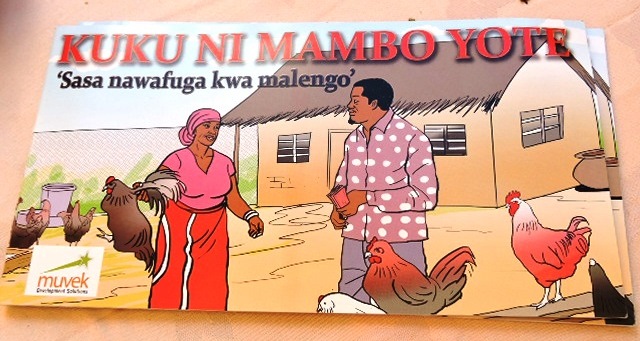More than 2,400 smallholder farmers across Tanzania will grow their businesses, reduce food security and create employment in the local economy. These are the concrete aims announced at the launch of the African Chicken Genetic Gains (ACGG) project in the country. According to Tadelle Dessie of the International Livestock Research Institute (ILRI), 70% of smallholder chicken producers in Africa are women so the decision to target them was straightforward. ‘They are best-placed to help transform the local chicken value chain.’
The project is working with universities, smallholder chicken producers, research centres, NGOs, government agencies, including the Tanzania Livestock Research Institute (TALIRI) and Sokoine University of Agriculture. ACGG plans to identify and cross-breed high producing exotic chickens with local breeds. Working closely with smallholder farmers, particularly women, ACGG partners will then test not only are highly productive chickens, but those which meet local tastes.
Introducing the project at the launch in Dar es Salaam in mid-July, the project director, Tadelle Dessie, defined the role of ILRI as providing capacity-building, leadership and technical support to the partners in all three participating countries: Ethiopia, Nigeria and Tanzania. A particularly important aspect is to nurture partnerships between public and private sector stakeholders, ensuring long-term viability of the venture and support to smallholder chicken producers.
Part of the viability of the project will depend on its financial sustainability, which means producing high value chicken which can be processed, marketed and sold on local markets. Involving all the actors in a participatory manner is high on the ILRI list of priorities.
For Rehema Mwateba, member of the Tanzania Gender Network Programme, it is important that the project informs and involves government officials at all levels about the project. She cautions to avoid household conflicts by making sure that men are made aware of how the project will benefit them.
On engaging rural women, she thinks the project should consider working with women groups and use booklets with pictures and illustrations about poultry husbandry. This material, she added, should be also distributed strategically at churches and clinics, and over the radio and TV, a sentiment echoed by others who attended the launch.
The event was attended by the permanent secretary in the Ministry of Livestock and Fisheries Development, Yohana Budeba, and by Donald Nkrumah, the project officer responsible for the project in the Bill & Melinda Gates Foundation.
African Chicken Genetic Gains is an Africa-wide collaboration led by the International Livestock Research Institute. Part of the wider ‘LiveGene‘ initiative, ACGG tests and makes available high-producing, farmer-preferred genotypes that increase smallholder chicken productivity in Africa.
For more information visit the ACGG website.
ACGG in the news:
Here comes mammoth project for 2,400 smallholder chicken farmers

Local poultry famers need to be well iformed about this project through local government officials.
LikeLiked by 1 person
how your project benefit your community member except individuals working on your project? What contribution your community contribute to your project?
LikeLike
This project benefits the community in that more protein is available for consumption. African Chicken buys back 90% of the grown chickens, and prepares them for supermarkets. The remaining 10% remain with the women who raised them, to be eaten or sold as desired.
Moreover, the profits from this project do not all go to making the owner wealthy. Rather, profits enable the company to employ more women, which benefits those communities in many many ways. Any time a woman in the developing world gets more disposable income, her family benefits, and her neighbors can benefit, too (who will she buy things from? what will her better-educated children do? and so on)
LikeLike
I am a poultry farmer in Dar es Salaam and I’m interested in the project. Kindly put me in touch with officials in Tanzania.
LikeLike